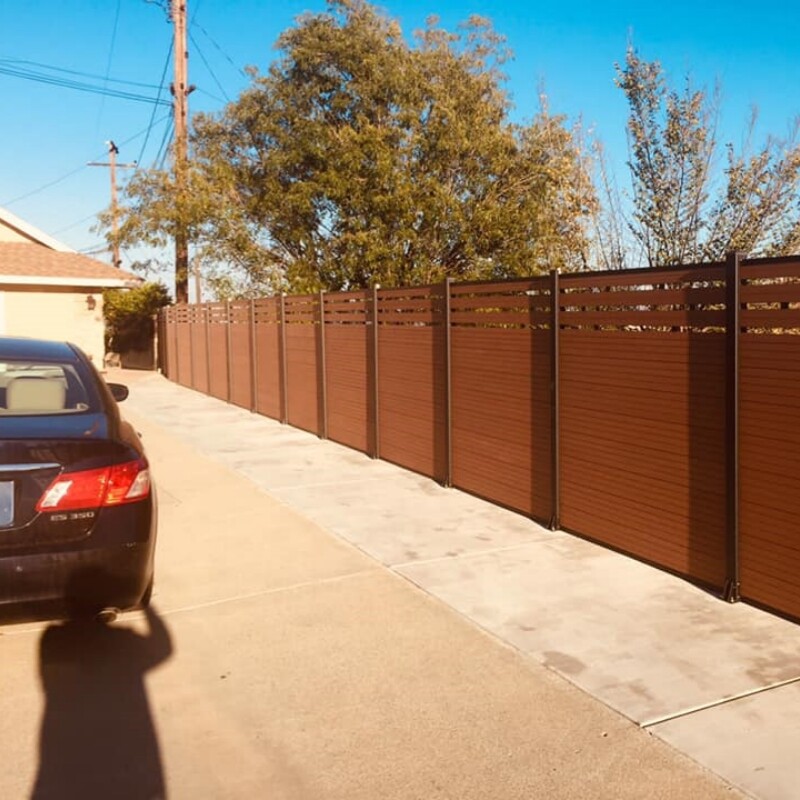Email cannot be empty
Password cannot be empty
Email format error
Email cannot be empty
Email already exists
6-20 characters(letters plus numbers only)
The password is inconsistent
Email format error
Email cannot be empty
Email does not exist
6-20 characters(letters plus numbers only)
The password is inconsistent


When it comes to choosing a fence for your home, two popular options are composite and vinyl fences. Both materials offer their own unique benefits and drawbacks, so it’s important to weigh these carefully to find the best fit for your needs. In this blog, we’ll dive deep into the world of composite and vinyl fences, comparing their features, advantages, and potential downsides to help you make an informed decision.
A composite fence is made from a combination of wood fibers and plastic. This mixture is designed to mimic the look of natural wood while offering enhanced durability and low maintenance. The manufacturing process involves blending wood fibers with recycled plastic to create boards that are sturdy and resilient.
Advantages of Composite Fences:
Durability: Composite fences are known for their strength and longevity. They are resistant to warping, rotting, and insect damage. Unlike traditional wood fences, composite fences won’t splinter or crack over time.
Low Maintenance: One of the biggest perks of composite fences is that they require very little maintenance. There’s no need for regular painting or staining, and they can be easily cleaned with a hose or a mild detergent.
Eco-Friendly: Composite fences often use recycled materials, making them a more environmentally friendly option compared to other materials. This can be a big selling point for those who are conscious about their environmental impact.
Aesthetic Appeal: Composite fences come in a variety of colors and styles, allowing you to choose an option that complements your home’s exterior. They can also be designed to mimic the look of natural wood, providing a classic aesthetic without the upkeep.
Disadvantages of Composite Fences:
Cost: Composite fences tend to be more expensive upfront compared to wood or vinyl fences. However, this cost can be offset by the reduced maintenance expenses over the years.
Heat Sensitivity: Composite materials can expand and contract with temperature changes. In extremely hot conditions, composite fences might become soft or bend, though this is usually not a significant issue under normal circumstances.
Limited Repairs: If a composite fence does get damaged, it can be more difficult to repair compared to other types of fencing. Often, the entire panel might need to be replaced, rather than just a section.
Vinyl fences are made from polyvinyl chloride (PVC), a type of plastic. They have gained popularity due to their modern look and ease of maintenance. Vinyl fences are manufactured to be sturdy and long-lasting, making them a favorite among homeowners looking for a low-maintenance fencing solution.
Advantages of Vinyl Fences:
Low Maintenance: Like composite fences, vinyl fences require minimal upkeep. They don’t need to be painted or stained, and they can be cleaned easily with soap and water.
Durability: Vinyl fences are resistant to weather conditions, including heavy rain, wind, and extreme temperatures. They don’t rust, crack, or warp, making them a reliable choice for many climates.
Variety: Vinyl fences come in a wide range of colors, styles, and heights. This allows you to find a design that suits your property and personal taste.
Pest Resistant: Unlike wood, vinyl fences are impervious to pests like termites and ants. This makes them a good option for areas with high insect activity.
Disadvantages of Vinyl Fences:
Cost: Vinyl fences can also be relatively expensive, particularly when compared to wood. However, their durability and low maintenance can make them a cost-effective choice in the long run.
Appearance: Some homeowners feel that vinyl fences lack the natural look and texture of wood or composite fences. While vinyl can mimic the appearance of wood, it may not satisfy those who prefer a more organic aesthetic.
Color Fading: Over time, vinyl fences can be prone to color fading, especially in areas with intense sunlight. This can affect the overall appearance of the fence, although the process is typically gradual.
Environmental Impact: Although vinyl fences are long-lasting, they are made from plastic, which is not biodegradable. This can be a concern for those who prioritize sustainability.
When choosing between composite and vinyl fences, consider the following factors:
1. Aesthetic Preferences:
2. Budget:
3. Climate and Environment:
4. Maintenance Needs:
5. Environmental Considerations:
Choosing between a composite fence and a vinyl fence ultimately depends on your priorities and preferences. Both options offer durability, low maintenance, and a range of styles, but they have distinct differences that might sway your decision. Composite fences are great for those who love the look of wood and want an eco-friendly option, while vinyl fences are perfect for those seeking a modern, low-maintenance solution that can handle tough weather conditions.
Take into account your budget, aesthetic preferences, and long-term maintenance when making your choice. Whether you opt for a composite fence or a vinyl fence, investing in a high-quality product will enhance your home’s curb appeal and provide reliable performance for years to come.